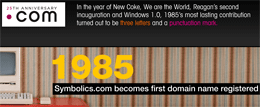

The U.S. Federal Communications Commission unveiled a plan on Tuesday proposing minimum broadband speeds of 100Mbps. In his remarks, FCC's chief Julius Genachowski said: "To meet the imperatives of global competitiveness and enduring job creation, we must have broadband networks of such unsurpassed excellence that they will empower American entrepreneurs and innovators to build and expand businesses here in the United States. Our plan will set goals for the U.S. to have the world's largest market of very high-speed broadband users. A '100 Squared' initiative -- 100 million households at 100 megabits per second -- to unleash American ingenuity and ensure that businesses, large and small, are created here, move here, and stay here." more
Stéphane Bruno writes: "In the first few hours that followed the earthquake, mobile service was completely disrupted. It was almost impossible to place a call, due to the combination of the damages on the cellular networks and the spike in phone calls. However, on some networks, SMS service was still available. People stuck under rubbles started texting to their friends and family (in Haiti and abroad) to tell them they were still alive and needed help. Those friends and family, not knowing what to do, started posting these SOS messages on their social networks, mainly on Facebook." more
Garth Bruen writes: Within the next few weeks Google plans to update its pharmacy policy which will restrict pharmacy advertisements. Once in effect, the updated policy will only allow VIPPS and CIPA certified pharmacies to advertise. Additionally these pharmacies can only target ads within their country. more
 In a blog post today, Google has announced that they will begin a fiber network experiment of their own. From the announcement: "We're planning to build and test ultra high-speed broadband networks in a small number of trial locations across the United States. We'll deliver Internet speeds more than 100 times faster than what most Americans have access to today with 1 gigabit per second, fiber-to-the-home connections. We plan to offer service at a competitive price to at least 50,000 and potentially up to 500,000 people." more
In a blog post today, Google has announced that they will begin a fiber network experiment of their own. From the announcement: "We're planning to build and test ultra high-speed broadband networks in a small number of trial locations across the United States. We'll deliver Internet speeds more than 100 times faster than what most Americans have access to today with 1 gigabit per second, fiber-to-the-home connections. We plan to offer service at a competitive price to at least 50,000 and potentially up to 500,000 people." more
Joe Schoenmann of the Las Vegas Sun reports: "The Las Vegas City Council will debate today whether to strike a deal with an Internet entrepreneur who seeks to use the Internet suffix .vegas -- over the objections of Clark County officials and one local company who say the city is jumping the gun and in the process likely shortchanging Las Vegas and county taxpayers. The council will consider endorsing a proposal by Dot Vegas Inc., to create the top-level Internet domain ".vegas" -- a new suffix that could be used in addition to the familiar .com, .net, .gov or .org suffixes that end most Web addresses." more
 For the upcoming 25th anniversary of .com Top-Level Domain, VeriSign, the registry operator of the domain will launch a year-long initiative to celebrate the event. From the announcement: "In March 1985, the first .com domain was registered, igniting the birth of the consumer Internet that, 25 years later, continues to transform communications, commerce and our society as a whole. Beginning in March 2010, VeriSign, the long-time operator of the .com domain, will lead an industry-wide initiative to recognize the innovators and leaders that have shaped the first 25 years of .com and in doing so transformed our economy and society. The celebration of "25 Years of .com" will kick off with a policy-focused event in Washington, DC on March 16." more
For the upcoming 25th anniversary of .com Top-Level Domain, VeriSign, the registry operator of the domain will launch a year-long initiative to celebrate the event. From the announcement: "In March 1985, the first .com domain was registered, igniting the birth of the consumer Internet that, 25 years later, continues to transform communications, commerce and our society as a whole. Beginning in March 2010, VeriSign, the long-time operator of the .com domain, will lead an industry-wide initiative to recognize the innovators and leaders that have shaped the first 25 years of .com and in doing so transformed our economy and society. The celebration of "25 Years of .com" will kick off with a policy-focused event in Washington, DC on March 16." more
 Following his State of the Union Speech last week, Obama was asked a number of user-submitted questions via prepared via YouTube. Popular questions included the issue of open internet and neutrality, to which Obama responded: "I'm a big believer in Net Neutrality. I campaigned on this. I continue to be a strong supporter of it. My FCC Chairman Julius Genachowski has indicated that he shares the view that we've got to keep the Internet open..." more
Following his State of the Union Speech last week, Obama was asked a number of user-submitted questions via prepared via YouTube. Popular questions included the issue of open internet and neutrality, to which Obama responded: "I'm a big believer in Net Neutrality. I campaigned on this. I continue to be a strong supporter of it. My FCC Chairman Julius Genachowski has indicated that he shares the view that we've got to keep the Internet open..." more
January 28 is marked as International Data Privacy Day in order to help raise awareness and generate discussions about information privacy. This year companies such as Intel, Microsoft, Google, AT&T, LexisNexis and The Privacy Projects are sponsoring Data Privacy Day efforts. more
A proposal to extend the DNS protocol has been submitted by Google and other DNS and content providers such as Neustar/UltraDNS. Wilmer van der Gaast and Carlo Contavalli on behalf of the Google Public DNS team said: "Our proposed DNS protocol extension lets recursive DNS resolvers include part of your IP address in the request sent to authoritative nameservers. Only the first three octets, or top 24 bits, are sent providing enough information to the authoritative nameserver to determine your network location, without affecting your privacy." The proposal aims to ultimately help send users to nearby servers in order to improves speed, latency, and network utilization. more
Comcast today announced plans to conduct production-network trials of IPv6 technology this year. The trials are aimed at helping identify and solve any areas of difficulty involved in the transition to IPv6, and to determine what approach will be the easiest and most seamless for its customers, says Jason Livingood, Comcast's Internet System Engineer. more
The deployment of Domain Name System Security Extensions (DNSSEC) for the root zone got an official start today with its public signing for the first time. DNSSEC for the root zone is a joint effort between ICANN and VeriSign, with support from the U.S. Department of Commerce to improve security of the Internet's naming infrastructure. Kim Davies, ICANN's Manager of Root Zone Services, says: "What happened today was the deliberately un-validatable root zone started being published on l.root-servers.net. It is anticipated this will be rolled out across the other root servers over the coming months. This phase is designed to identify any issues with the larger DNS response sizes associated with DNSSEC data." more
 Apple CEO, Steve Jobs today announced the highly anticipated iPad and told the crowed that the company is now a $50 Billion a year company -- the majority of it being from sales of mobile devices including iPod, iPhone, and laptops. Now with the introduction of iPad, Jobs calls apple a mobile device company: "Apple is a mobile devices company. This is what we do." Jobs says Apple is the number one mobile devices company in the world. more
Apple CEO, Steve Jobs today announced the highly anticipated iPad and told the crowed that the company is now a $50 Billion a year company -- the majority of it being from sales of mobile devices including iPod, iPhone, and laptops. Now with the introduction of iPad, Jobs calls apple a mobile device company: "Apple is a mobile devices company. This is what we do." Jobs says Apple is the number one mobile devices company in the world. more
Royal Pingdom has put together a list of top ten places with designated country code Top-Level Domains that are barely inhabited. The list starts off with '.hm' for Heard and McDonald Islands, an Australlian territory, with zero population. Others include '.pn' for Pitcairn Islands (Population: 50), '.tf' for French Southern and Antarctic Lands (Population: 140), '.cc' for Cocos (Keeling) Islands (Population: 596) and '.va' for the Vatican City (Population: 826). more
Gadi Evron writes: "China responds to Google's accusations on its CNCERT web site, here. Johannes Ullrich just brought this to my attention on Facebook. In short, CNCERT wrote that China is the biggest victim of cyber attacks, and that Google lacks evidence to link the recent attacks to China as the perpetrator. I am certain more details and analysis will become available soon." more
A special board meeting was held today by ICANN in order to address the upcoming meeting in Nairobi and security concerns raised by the community as a result of recent events in the city. ICANN has reaffirmed it's commitment to the meeting in Nairobi and an announcement was made via a blog post by Rod Beckstrom, ICANN's President and CEO. more
Sponsored byIPv4.Global

Sponsored byWhoisXML API

Sponsored byRadix

Sponsored byVerisign

Sponsored byVerisign

Sponsored byCSC

Sponsored byDNIB.com
